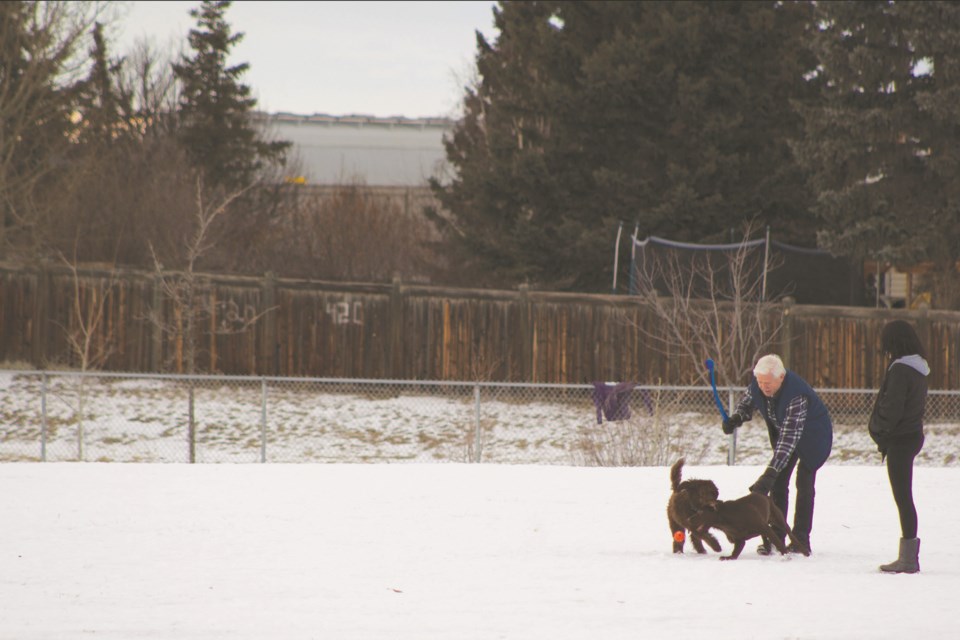As the COVID-19 pandemic continues, so too does social distancing, which means some residents may be struggling to maintain a normal level of activity for their canine companions.
According to Cody Shepherd, owner of The Place 4 Paws – located south of Airdrie – housebound pet owners also means cooped up dogs.
“[People are noticing] the amount of energy their dogs have because they’re not able to get out for regular walks or daycare or things they would normally do,” he said. “[COVID-19] has really interrupted our pets’ lives.”
While challenging, ensuring your dog still gets regular exercise is vital, according to Katelynn Kaiser, owner and head trainer with K9 Psychology Canine Trainer, located northeast of Airdrie near Bieseker.
“Physical exercise and mental exercise are super important to dogs, in my opinion, because they will put their energy into any kind of outlet that their finding is relieving that energy, whether it’s a positive thing like going for a run or going for a walk…or if they find it’s relieving their energy to bark,” she said.
Currently, Airdrie’s off-leash dog parks are open and remain an option. However, the City of Airdrie recommends pet owners using the parks – or even just going for regular walks in their neighbourhoods – maintain a two-metre distance between themselves and others to limit transmission of the virus.
If you are confined to the home due to illness or poor weather, it may be harder to expend your dog’s energy – especially if your backyard is small or nonexistent. Luckily, Shepherd said there are still activities that can keep pets both physically and mentally active inside the home.
“We call them brain games,” he said. “Basically, it’s utilizing an indoor space to allow your dog the opportunity to do things that they could normally do.”
One such brain game is hiding food around the house where the dog wouldn’t normally go to eat. Dogs naturally search out food, he said, which makes it easy to train them to search for their meal. The challenge can be increased when the dog catches on by hiding portions in multiple areas or spreading out the food over a wider area. Kaiser noted another variation involves setting out opaque containers and hiding food under only a few, so the dog has to figure out where their food is hidden.
“When a dog has its nose to the ground, they actually burn more energy doing those types of games than they do out for a walk, just because it’s so mentally stimulating for them,” Shepherd said. “Even after a half an hour of playing brain games with our dogs, they’re as tired as if they were out for an hour walk.”
Another brain game he recommends is “100 Things to Do With a Box.” Using any type of box, the owner devises criteria for what they want their pet to do – stick its left paw or nose inside the box, for example. A treat is offered as a reward once the dog has figured out the desired action. Gradually, the owner can make the desired action more challenging.
“Slowly, they start to learn that they are going to have to interact with this box in unique and novel ways in order to get their reward,” Shepherd said.
Kaiser added puzzle toys are also a great option to keep dogs mentally active. Teaching a dog to run on the treadmill will also help them burn energy if you are unable to take them for a walk.
The Association for Professional Dog Trainers, apdt.com, has an online resource centre with ideas of activities to do with your pet, Shepherd said.
Besides physical and mental activity, Kaiser said pet owners also “need to remember our emotions play into our pet’s behaviour.”
“I find dogs are very perceptive to our emotions…so they really pick up on how we’re feeling,” she said. “When we’re feeling stressed or we’re feeling uncertain or anxiety, they really pick up on that and it makes them come to a place of uncertainty and a place of fear.”
This can lead to poor behaviour, Kaiser said, like frequent barking, licking or chewing items.
“A dog who never had a destructive behaviour before, might all of a sudden be chewing on your shoes or grabbing socks,” she said.
Owners should also prioritize their own mental and emotional well-being, Kaiser said, which will help calm their dog’s emotions. A simple way to do this is to dedicate some time to pet and soothe your pet, which may also soothe the owner.
Shepherd has been hosting online sessions through email to answer questions about pet ownership during COVID-19, which he hopes to turn into a series of videos. Until the videos are available, he said, questions can be sent to [email protected]
Kaiser said she is also fielding questions from pet owners and can be reached by email at [email protected]
“[COVID-19] is a global thing and, as cliché as it is, we’re all in this together,” Shepherd said. “It can be overwhelming to deal with an animal in your house, especially if they’re used to a certain routine that you’re not able to provide them anymore.”
Follow our COVID-19 special section for the latest local and national COVID-19 news, resources, FAQs and more.
Follow me on Twitter @BenSherick

